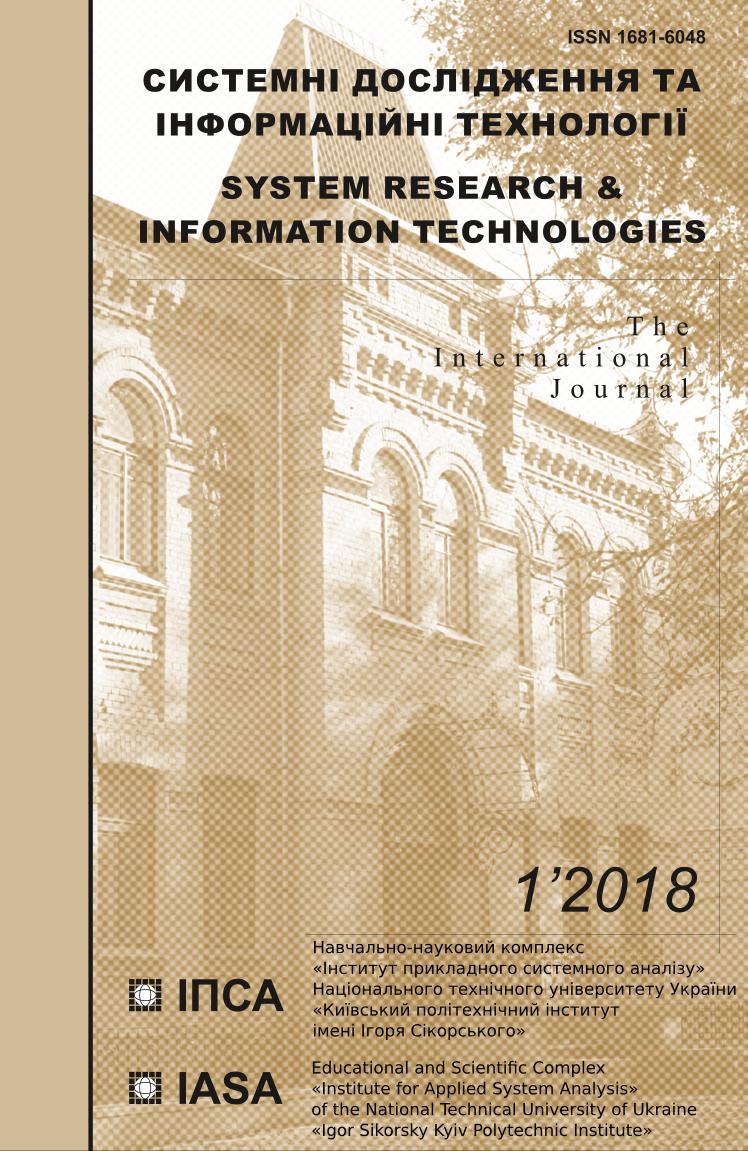Military conflicts modeling by making use of Bayesian networks
DOI:
https://doi.org/10.20535/SRIT.2308-8893.2018.1.06Keywords:
modeling, military conflict, Bayesian networks, forecastingAbstract
General approaches to modeling military conflicts are considered. A probabilistic and statistical model for computing probability of a military conflict in the form of Bayesian network was constructed. The complexity of modeling military conflicts is due to the high dynamics of interacting systems with many unknown or non-measurable variables and parameters. The constructed model takes into consideration incompleteness and fuzziness of the available information. The purpose of the model is not only in revealing existing links and dependencies between the processes selected, but also in forecasting the probability of future conflicts using results of the analysis of the current situation. A modeling was performed using available statistical data, a series of computational experiments was fulfilled and analysis of the results was performed. Statistical data was taken from open sources. The constructed model was used for computing the probability of internal and external conflicts for Ukraine. The obtained numerical results correspond to the actual situation.References
Bohatyr'ov E.Ja. Analiz metodiv vijs'kovo-politychnoho prohnozuvannja / E.Ja. Bohatyr'ov, Ju.D. Makiyev, V.P. Malishev // Stratehija hromadjans'koho zakhystu: problemy ta doslidzhennja. — 2013. — T. 3. — №2(5).
Abayev L.Ch. Modeljuvannja kryz i konfliktiv u mizhnarodnykh vidnosynakh: dosvid praktychnoho zastosuvannja / L.Ch. Abayev // Problemy natsional'noyi stratehiyi. — 2012. — № 1. — S. 57–72.
Roma O.M. Sposib formalizatsiyi konfliktu ta joho systemne modeljuvannja / O.M. Roma, V.B. Tolubko, S.V. Lyenkov // Ukrainian Information Security Research Journal. — 2009. — T. 11. — № 3(44).
Adamenko A.A. Metodyka formuvannja mnozhyny faktoriv voyennoho konfliktu ta systemy vzayemozv’jazkiv mizh nymy / A.A. Adamenko // Nauka i tekhnika povitrjanykh zbrojnykh syl Ukrayiny. — 2011. — № 1. — S. 141–145.
Beck N. Improving Quantitive Studies of International Conflict: A Conjecture / N. Beck, G. King, Z. Langche // American Political science review. — 2000. — Vol. 94. — N 1. — P. 21–35.
Marwala T. Modelling and Controlling Interstate Conflict, Budapest / T. Marwala, M. Lagazio // Hungary: IEEE International Joint Conference on Neural networks. — 2004. — P. 1–6.
The Human Development concept [Digital source]. —Available at: http://hdr.undp.org/en/humandev/
Slovnyk ukrayins'koyi movy: v 11 t. / AN URSR, In-t movoznavstva; za red. I.K. Bilodida. — T. 4. — K.: Nauk. dumka, 1973. — S. 42.
Lambsdorff J. How Corruption Affects Persistent Capital Flows / J. Lambsdorff // Economics of Governance. — 2003. — Vol. 4. — P. 229–243.
Etymolohichnyj slovnyk ukrayins'koyi movy: v 7 t. / AN URSR, In-t movoznavstva im. O.O. Potebni; red. kol.: O.S. Mel'nychuk, I.K. Bilodid, V.T. Kolomiyets', O.B. Tkachenko. — T. 2. — K.: Nauk. dumka, 1982. — S. 31.

